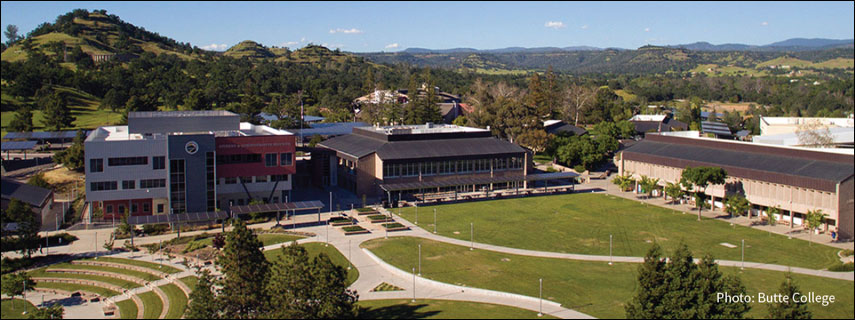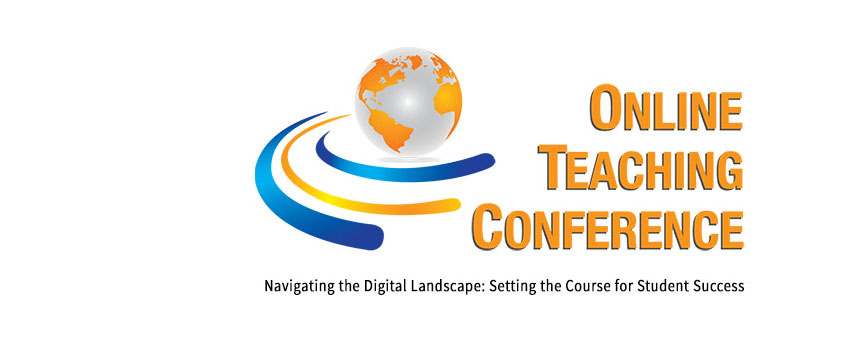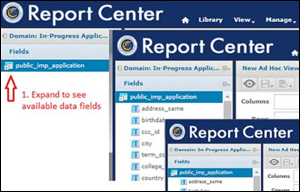- Details
- Written by Crista Souza
- Category: Uncategorised
- Hits: 18071
Connecting The California Community Colleges
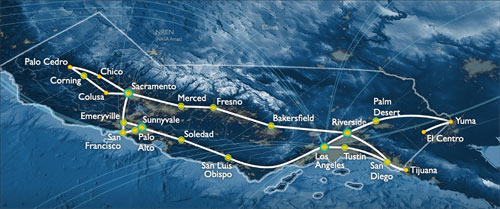 Partnering with the Corporation for Educational Network Initiatives in California (CENIC) to use the California Research and Education Network (CalREN) high-bandwidth, high-capacity fiber network has resulted in millions of dollars in savings for the California Community Colleges.
Partnering with the Corporation for Educational Network Initiatives in California (CENIC) to use the California Research and Education Network (CalREN) high-bandwidth, high-capacity fiber network has resulted in millions of dollars in savings for the California Community Colleges.
To report network routing or technical issues related to CENIC-managed circuits or CENIC Network, contact the CENIC Network Operations Center at This email address is being protected from spambots. You need JavaScript enabled to view it., or by phone at 714-220-3494. The CENIC NOC is available 24/7.
To address bandwidth demand for the near future, the CCC Technology Center is working with CENIC to upgrade the majority of circuits connecting the colleges to CalREN to 10Gbps. In addition, approved college centers will receive 1Gbps primary and 1Gbps secondary circuits. These upgrades are expected to be in place by fiscal year 2023-24, and provide sufficient capacity for at least 10 years.
The chart below shows a monthly breakdown of completed circuits to date. Select the image to enlarge it.
Farther out, the Technology Center will look to acquire fiber, which could reduce long-term leasing cost.
Get More Information
- Details
- Written by Crista Souza
- Category: Uncategorised
- Hits: 21046
SuperGlue
 SuperGlue is an integration architecture developed by the California Community Colleges Technology Center to allow disparate Student Information Systems (SIS) to connect in a standardized way to systemwide technologies developed by the Technology Center or purchased by the CCC Chancellor's Office, such as the Multiple Measures Placement Service and the Canvas course management system.
SuperGlue is an integration architecture developed by the California Community Colleges Technology Center to allow disparate Student Information Systems (SIS) to connect in a standardized way to systemwide technologies developed by the Technology Center or purchased by the CCC Chancellor's Office, such as the Multiple Measures Placement Service and the Canvas course management system.
SuperGlue provides a secure, robust framework for data exchange between these systemwide products and the colleges who use them. A key objective is to integrate all Chancellor’s Office-sponsored technology initiatives without putting additional burden on local college IT departments.
The architecture has three main parts:
College Adapter
The college adapter is a software component that is installed locally behind a college’s firewall to facilitate data running in and out of the college’s SIS. It enables disparate SIS’ to communicate in a standardized way through a cloud service, such as the Canvas course management system.
Standardized Data
An SIS configuration layer marshals SIS data, and moves it in and out of standard data models.
Data Exchange Using MDM
A data exchange model built around Master Data Management (MDM) gives each college flexibility to choose their SIS, and whether/how often to synch it with the centralized applications. MDM eliminates multiple point-to-point data exchanges across the systemwide products and colleges and replaces them with a single point of reference for reading and writing data.
For more about SuperGlue, explore the CCC Glue: College Adaptor discussions on the CCCTechnology staff helpdesk.
- Details
- Written by Crista Souza
- Category: Uncategorised
- Hits: 22076
CCC Systemwide Technology Platform
The California Community Colleges Technology Center facilitates a CCC Systemwide Technology Platform standard that allows the system to build new Web 2.0 applications that work together, provide sharable services to the colleges, and can incorporate legacy functionality as we transition to the next generation.
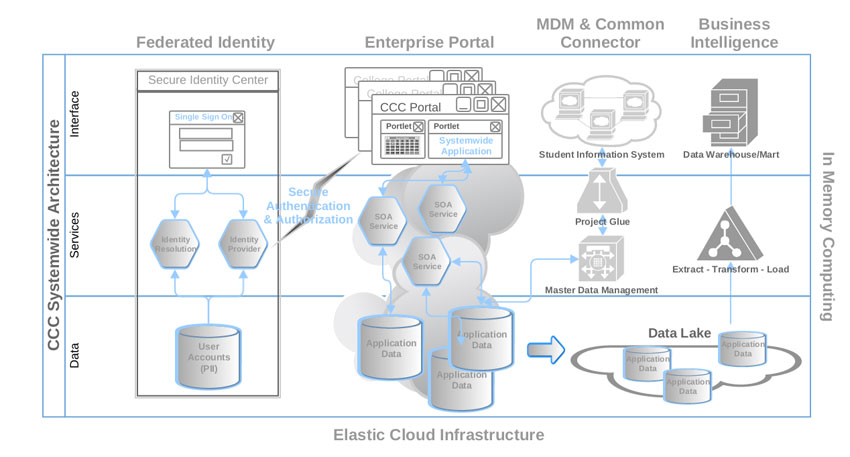
The Systemwide Technology Platform is composed of the following technologies:
Service-Oriented Architecture (SOA): Under this model, siloed applications are deconstructed into their component services and connected via secure Internet communications. This enables these component services to be reused by college or vendor applications and combined into composite applications.
Enterprise Portals: Most of the colleges are moving to some form of portal interface for their students. By providing our systemwide applications as portlets to the colleges, they can be plugged in to provide additional services and functionality for students. In addition, a systemwide portal would tie together our applications with a common front end.
Federated Identity: CSU, UC, and the California Community Colleges (CCC) have Federated Identity initiatives based on the InCommon Federation. Click for information about centrally paid InCommon membership for CCC. InCommon includes over 200 higher education Institutions, government agencies and vendors. The OpenCCC Federated Identity enables a common sign-in for students and staff across systemwide applications and institutions while increasing security and privacy.
Elastic Cloud Infrastructure: The emergence of elastic cloud platforms, where the computing power behind deployed applications is monitored to scale up or down to service demand loads, has made it possible to efficiently handle the annual cyclic student demand on student services applications without having to build a large data center to handle peak loads.
Business Intelligence: To facilitate analysis of student pathways, outcomes, transfer, and institutional performance for continuous improvement, there is a need to bring together various disparate data sourced from the existing applications within our system, and tie them together into usable structures that can be easily researched and presented to end users in a usable format for immediate and future decision making purposes.
Transforming The Platform
With the emergence of services from statewide initiatives such as CCC MyPath, new requirements have surfaced for the Systemwide Technology Platform.
Project Glue/SuperGlue: To not overwhelm college IT departments with connecting many new services to their Student Information Systems, there is a need to have a common connector and local control mechanism so that college IT only have to implement one interface and can control how data flows into and out of their SIS.
Data Lake: All of the new systemwide services are generating actionable data that can improve student outcomes and facilitate institutional improvement. There is a need to save data for long term research opportunities.
In-Memory Computing: Compute-intensive operations such as the recommender engine in the CCC MyPath portal must run in real time at a scale of tens of thousands of simultaneous sessions.
- Details
- Written by Crista Souza
- Category: Uncategorised
- Hits: 15086
Centrally Paid InCommon Membership
 To facilitate our federated identity initiative to allow single sign-on access to all systemwide technology offerings, CCCCO and the CCC Technology Center have put together an agreement for InCommon Membership for all California Community Colleges to be paid centrally moving forward. Ongoing funding for this effort is a part of the Technology Initiatives for Student Success funded by the legislature.
To facilitate our federated identity initiative to allow single sign-on access to all systemwide technology offerings, CCCCO and the CCC Technology Center have put together an agreement for InCommon Membership for all California Community Colleges to be paid centrally moving forward. Ongoing funding for this effort is a part of the Technology Initiatives for Student Success funded by the legislature.
InCommon, operated by Internet2, provides a trust fabric for higher education, their vendors, and partners to facilitate single sign-on from local campus accounts. InCommon also operates a related assurance program, and offers security certificate and multifactor authentication services.
The addition of CCC's 116 members will boost InCommon to more than 1,000 participants, including 679 higher education institutions, 32 government and non-profit research centers, and 296 corporate sponsored partners. InCommon now serves more than 10 million users.
Immediate Savings for Security Certificates
As InCommon members, colleges may see an immediate savings in using the security certificate program. (Contact Technology Center College Experience Managers at This email address is being protected from spambots. You need JavaScript enabled to view it. for information about how to receive certificates for your college.)
Single Sign-On for Higher Education Vendors
Microsoft, Blackboard, Canvas, Box, Dropbox, National Student Clearinghouse, rSmart, Parchment and EBSCO are among the many participants in InCommon providing online services to colleges.
Single Sign-On for CCC Systemwide Technology Offerings
Low- or no-cost offerings to the colleges such as the Common Course Management System (Canvas), CCC MyPath, Education Planning, Degree Audit, Retention (Hobsons/Starfish), CCCApply, and all systemwide technology will be available to the colleges via the InCommon Federation when released.
How Do We Sign Up?
For information about how to sign up for InCommon membership, please read Joining InCommon Federation, or contact the Enabling Services College Relationship Managers at This email address is being protected from spambots. You need JavaScript enabled to view it..
- Details
- Category: Uncategorised
- Hits: 26994
Projects

The California Community Colleges Technology Center is composed of many unique projects. Please follow the links below or in the Projects menu above to explore the breadth and depth of initiatives facilitated by the Tech Center:
- CENIC
- CCC Systemwide Technology Platform
- SuperGlue
- CCC Data
- OpenCCC & Systemwide ID
- CCCApply
- CCC MyPath
- Multiple Measures Placement Service
- Information Security Software
- CCC Accessibility Center
- SSO Federation
- Articulation & Transfer
Tech Center Highlights
We bring systemwide enabling technologies to our colleges.
Adopt Our Tech
From connectivity to student services and educational technology.
Connecting Colleges
Gigabit fiber optic network for all of our colleges.
Information Security
Logging, monitoring, and no-cost tools to protect students and educators.
Accessibility
Training and resources to make tech accessible to users with disabilities.
Events
Upcoming CCC Technology Center workshops and webinars.
About the Technology Center
The California Community Colleges Technology Center, hosted by Butte College, facilitates and coordinates the work of systemwide technology. Our 25-year history of collaboration with the Chancellor’s Office and community colleges throughout the state has resulted in great strides forward for the system in areas including federated identity, application architecture, networking, and student services.
We operate under the Gartner model of “Run, Grow, Transform” to simplify our portfolio of services and prioritize resources in support of ongoing operations, the next phase of growth, and longer term transformative innovation.


